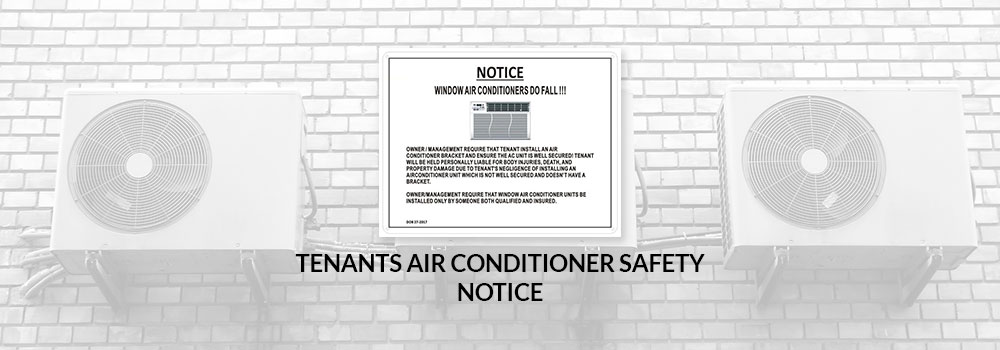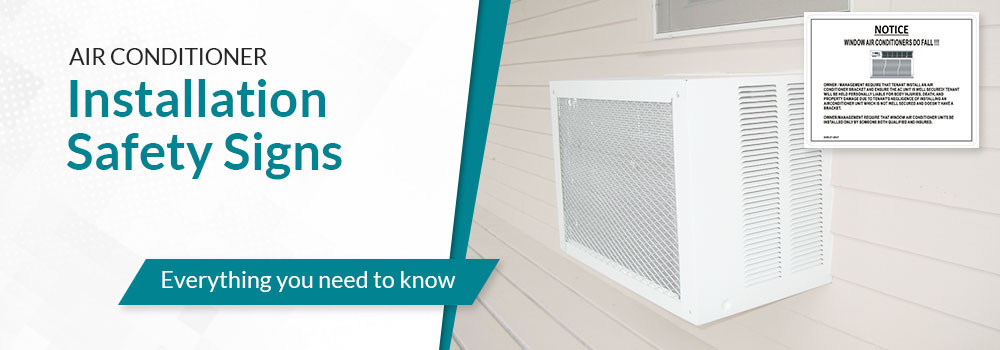No products in the cart.
Blog
All About Air Conditioner Safety Sign NYC You Need To Know
Air Conditioner Safety Sign – Do I need a permit to install an AC?
In this segment of our Landlord 101 series, we’ll be looking at something many New Yorkers — whether tenants or fledgling property owner/managers — often overlook. During cold and seemingly endless winters in the northeast, we can often forget just how hot and humid it will become in just six months. For many in established prewar buildings and smaller multifamily houses from Queens and the Bronx to Manhattan, Brooklyn and Staten Island — the ubiquitous window AC unit can be an afterthought — and one that only takes center stage once the humidity and thermometers begin to creep past 80.
That’s why this week, during some hopefully relaxing holiday downtime, may be the best opportunity to start thinking about your procedures for ensuring air conditioners are both safely and legally installed — as well as how much you may charge for installing your own units in rent regulated buildings. The time to begin the process of providing a comfortable, cool and city compliant environment for your residents throughout the long, hot, dog days and nights of summer is now.
Air Conditioner Safety Sign: Do I need a Permit?
According to the NYC Department of Buildings (DOB), air conditioners must be installed securely, as part of existing laws about maintaining the safety of building facades — which includes any devices or appliances sticking out past the window line. The building owner is responsible for any window air conditioners that present a hazard — whether due to improper installation, or tampering by a tenant.
That’s why ACs should always be securely attached to the building via metal brackets, and previously installed units should be inspected by the superintendent or landlord at the beginning and end of every season.
Air Conditioner Installations, Electrical Usage, and Improvements in Rent Regulated Apartments
There are also laws regarding what you can charge for providing your own units, or even your own electricity for tenants of rent stabilized or rent controlled apartments:
If the Landlord Pays for the Electricity: Each year in October, the NYC Rent Guidelines Board sets the monthly amount you may charge a rent-regulated tenant with a utilities-included lease for air conditioners installed after October 1, 1985.
If the Tenant Pays for Their Own Electricity: If the tenant pays for their own electricity and provides their own unit, the building owner may charge a $5 monthly window fee for every AC unit which protrudes past the window line.
If the Landlord Provides the AC Unit: To recoup some of the cost of providing an air conditioner, the building management may charge rent-stabilized tenants for an Individual Apartment Improvement (IAI) of either:
1/40th the price of the improvement in a building with 35 apartments or less.
Or 1/60th the price of the improvement in a building possessing more than 35 apartments.
Ensure Air Conditioner Safety Sign in Writing
Even if your property is not rent regulated, you may still mandate a professional AC installation (and don’t forget about removal!) — either through the building superintendent, a veteran handyman, or by installers sent from the appliance retailer — in writing on your lease.

Remember that unless it’s explicitly stated in writing, if an air conditioner is installed or taken out improperly, you the landlord are liable for any violations — not the tenant. It is also important to post notices, reminding residents of the building policy regarding air conditioner use — including the mandated use of brackets to keep the air conditioner secured to the exterior wall.
The general rule of thumb is that a window air conditioning unit should be fastened to the building in such a way that it cannot be moved, either by weather/wind conditions or if the window itself is opened.
Why Air Conditioner Safety Sign Is So Crucial
Other than the potential for city fines and damage stemming from an improper installation, there is also the issue of public safety. Air conditioners do occasionally fall out of windows and seriously injure people. There are even documented cases of people being killed by them.
Aside from the legal liability and bad publicity of a gruesome occurrence, the inescapable feelings of guilt for not preventing such an easily avoidable accident would certainly be traumatic.
Even the thought of such possibilities should make the relatively meager time and capital investments involved in being a responsible owner and good neighbor more than worth the trouble.
If you have any questions about HPD, DOB, FDNY or other regulatory and general building signage, please see our video checklist of required signs, email info@hpdsignsny.com, or call HPD Signs NY at (718) 213-7467 to speak with an experienced customer service representative.

